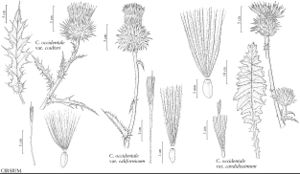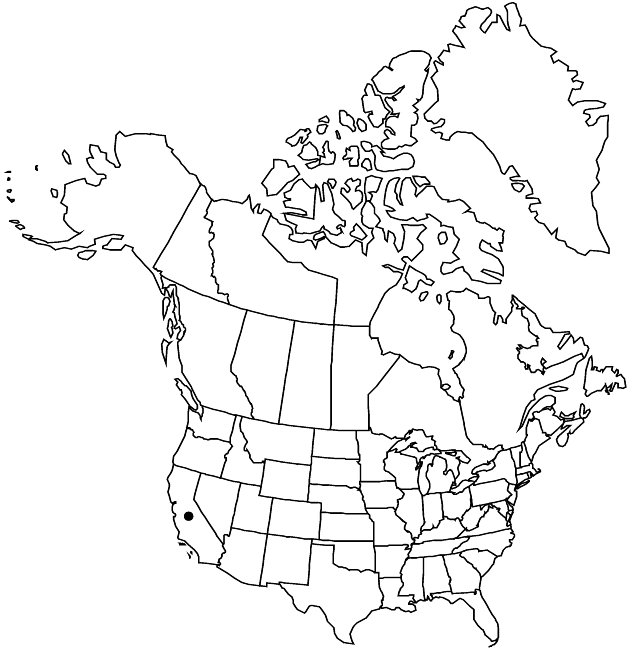Difference between revisions of "Cirsium occidentale var. californicum"
Phytologia 73: 315. 1992.
FNA>Volume Importer |
FNA>Volume Importer |
||
| Line 8: | Line 8: | ||
}} | }} | ||
|common_names=California thistle | |common_names=California thistle | ||
| − | |basionyms={{Treatment/ID/ | + | |basionyms={{Treatment/ID/Basionym |
|name=Cirsium californicum | |name=Cirsium californicum | ||
|authority=A. Gray | |authority=A. Gray | ||
| + | |publication_title=in War Department [U.S.], Pacif. Railr. Rep. | ||
| + | |publication_place=4(5): 112. 1857 | ||
}} | }} | ||
|synonyms={{Treatment/ID/Synonym | |synonyms={{Treatment/ID/Synonym | ||
| Line 36: | Line 38: | ||
|elevation=100–2200 m | |elevation=100–2200 m | ||
|distribution=Calif. | |distribution=Calif. | ||
| − | |discussion=<p>Variety californicum occurs in both coastal and interior mountains of California from the northern South Coast Range and the northern Sierra <i>Nevada</i> to the mountains of southwestern California. Considerable variation exists in head size, corolla color, and in length and display of phyllary appendages. In several areas of its range, the predominantly white- to light purple-flowered <i></i>var.<i> californicum</i> occurs with red-flowered <i></i>var.<i> venustum</i>. These plants are highly interfertile (H. Wells 1983; D. J. Keil and C. E. Turner 1992). Introgressive hybridization among them has resulted in a variety of emergent phenotypes and may have contributed to the variation within <i></i>var.<i> californicum</i>.</p> | + | |discussion=<p>Variety californicum occurs in both coastal and interior mountains of California from the northern South Coast Range and the northern Sierra <i>Nevada</i> to the mountains of southwestern California. Considerable variation exists in head size, corolla color, and in length and display of phyllary appendages. In several areas of its range, the predominantly white- to light purple-flowered <i></i></i>var.<i><i> californicum</i> occurs with red-flowered <i></i></i>var.<i><i> venustum</i>. These plants are highly interfertile (H. Wells 1983; D. J. Keil and C. E. Turner 1992). Introgressive hybridization among them has resulted in a variety of emergent phenotypes and may have contributed to the variation within <i></i></i>var.<i><i> californicum</i>.</p> |
|tables= | |tables= | ||
|references= | |references= | ||
| Line 60: | Line 62: | ||
|publication year=1992 | |publication year=1992 | ||
|special status= | |special status= | ||
| − | |source xml=https://jpend@bitbucket.org/aafc-mbb/fna-data-curation.git/src/ | + | |source xml=https://jpend@bitbucket.org/aafc-mbb/fna-data-curation.git/src/f6b125a955440c0872999024f038d74684f65921/coarse_grained_fna_xml/V19-20-21/V19_118.xml |
|tribe=Asteraceae tribe Cardueae | |tribe=Asteraceae tribe Cardueae | ||
|genus=Cirsium | |genus=Cirsium | ||
Revision as of 19:35, 24 September 2019
Plants erect, usually 50–200 cm, thinly to densely gray-tomentose, sometimes glabrate. Leaf faces abaxially green to gray, adaxially gray. Heads in ± open clusters, short- to long-pedunculate, elevated well above proximal leaves. Involucres usually about as wide as long, 1.5–5 cm, subglabrous to densely arachnoid. Phyllaries usually imbricate, mid apices appressed to loosely spreading or ascending, sometimes twisted, usually less than 1 cm (but sometimes much longer), 1–3 mm. Corollas white to light purple or rose, 18–35 mm. 2n = 28, 29, 30 (as C. californicum).
Phenology: Flowering spring–summer (Apr–Aug).
Habitat: Pine-oak woodlands, riparian woodlands, chaparral, openings in mixed evergreen forests, roadsides
Elevation: 100–2200 m
Discussion
Variety californicum occurs in both coastal and interior mountains of California from the northern South Coast Range and the northern Sierra Nevada to the mountains of southwestern California. Considerable variation exists in head size, corolla color, and in length and display of phyllary appendages. In several areas of its range, the predominantly white- to light purple-flowered var. californicum occurs with red-flowered var. venustum. These plants are highly interfertile (H. Wells 1983; D. J. Keil and C. E. Turner 1992). Introgressive hybridization among them has resulted in a variety of emergent phenotypes and may have contributed to the variation within var. californicum.
Selected References
None.

